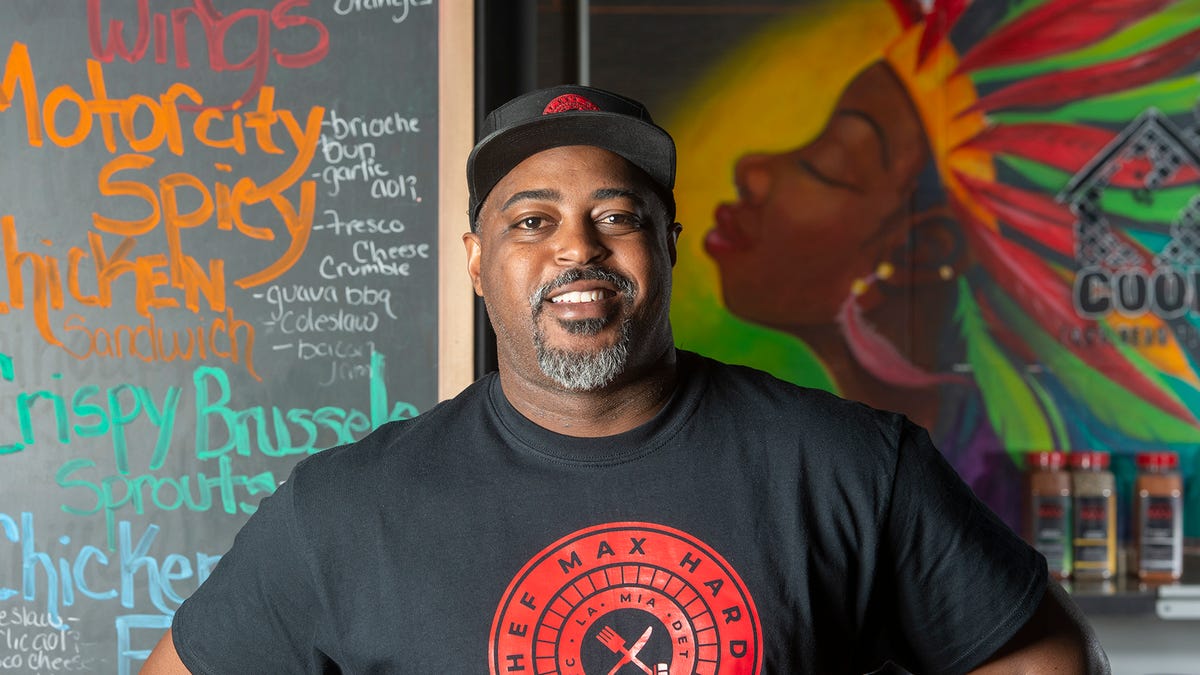Minnesota
Recipe: Roasted cauliflower with red coconut curry

Chef Yia Vang, host of The Outdoor Channel show Feral, shared this recipe with WCCO Mid-Morning viewers.
Roasted Cauliflower w/ Red Coconut Curry
1 whole head of cauliflower (cleaned)
1 Tbsp Oil
1 Tbsp salt
• Oil the top of the cauliflower and sprinkle w/ salt
• Place in grill on non heated side making sure your BGE is around 300 degrees
Sauce:
• 12 oz Coconut cream
• 3 Tsp Red Curry paste
• 2 cloves of garlic
• 2 Tsp Ginger
• 2 Tbsp Chopped lemongrass
1. Put all ingredients in a 2 qt pot and slow simmer for 15 mins then blend everything to a smooth consistency.
Roast off cauliflower and finish with sauce on top…add chopped cilantro and squeeze of fresh lime juice
Thanks for reading CBS NEWS.
Create your free account or log in
for more features.

Minnesota
INTERVIEW: Minnesota Soul Festival

Minnesota’s first-ever Soul Festival is happening next Saturday and celebrates Minnesota soul in all its forms with music, dance, art and more.
On Saturday morning, 5 EYEWITNESS NEWS anchor Leah McClean sat down with Alfred Babington-Johnson, the Founder and CEO of Stairstep Foundation—the organization that’s presenting the festival—to talk about the event.
The event will be at US Bank Stadium on Saturday, May 25 from 11 a.m. to 6 p.m. and admission is free.
For more information on the Minnesota Soul Festival click HERE.
Minnesota
Minnesota music legend Spider John Koerner dies at 85

Spider John Koerner was a fixture in Minnesota music on so many levels.
He sat at the same corner stool nearly every day at Palmer’s Bar in Minneapolis, where they kept an electric mug warmer for his coffee and brandy. He played the same style of Gretsch 12-string acoustic guitar everywhere from the Newport Folk Festival to Minneapolis’ Triangle Bar. And he sang many of the same old-school folk and blues songs at every gig for more than six decades, from Leadbelly and Memphis Minnie tunes to some of his own wry and weary originals.
Koerner’s mainstay presence goes back to Minneapolis’ West Bank folk and blues scene of the early 1960s, when he mentored a young Bob Dylan and recorded albums that influenced John Lennon, David Bowie, Bonnie Raitt and Beck.
The lanky song man’s unchanged, unflappable, old-reliable presence in the Twin Cities music scene was finally upended this weekend, when the influential guitarist and singer of “blues, rags and hollers” died of cancer at age 85. He had begun receiving hospice care several weeks earlier.
Koerner died peacefully at 2:35 a.m. Saturday at his home in Minneapolis, according to his son, Chris Kalmbach, who was there at the home along with other family members.
“The music world lost a great artist, and we lost Grandpa John,” Kalbach said.
Originally from Rochester, N.Y., Koerner made his biggest mark via the acoustic trio Koerner, Ray and Glover, one of the first white acts to help bring authentic blues music to the fore.
Even before that trio took flight in 1963, though, Koerner made another big mark on modern music by schooling a failing University of Minnesota student from the Iron Range.
“When he spoke he was soft spoken, but when he sang he became a field holler shouter,” Dylan wrote of Koerner in his autobiography, “Chronicles, Vol. 1″ ― one of many accounts of the former Robert Zimmerman’s pivotal era learning songs from pickers in Minneapolis from 1960-1961 before heading to New York.
“Koerner was an exciting singer, and we began playing a lot together,” Dylan’s book continued. “I learned a lot of songs off Koerner by singing harmony with him and he had folk records of performers I’d never heard.”
Another future rock legend who learned from Twin Cities musicians, Raitt called Koerner “the old, venerable one” in the 1986 documentary film “Blues, Rags & Hollers — The Story of Koerner, Ray & Glover.”
“The guy that influenced a lot of other musicians that would come up,” Raitt said of him. “He became the fulcrum of the whole scene. I watched his hands. I learned a lot of things from him.”
Koerner came to Minnesota in 1956 to study aeronautical engineering at the U. He never fully gave up his engineer interests — stories abound of him tinkering on self-made items like telescopes and a boat — but he diverted into the Marine Corps and then focused on music as a career once Koerner, Ray & Glover started recording in 1963, first for a small folk label and then Elektra.
The same California label that bolstered the Doors and Paul Butterfield Blues Band (each also noted admirers of the Minnesota trio), Elektra issued “Blues, Rags & Hollers” in 1963 and the follow-up LP, “Lots More Blues, Rags & Hollers,” a year later.
They were the type of records that didn’t sell too well, but seemingly every musician who was anybody at the time owned them and devoured them.
Lennon cited that first record as a personal favorite in a 1964 Melody Maker profile. Bowie also praised it in a 2016 Vanity Fair story for “demolishing the puny vocalizations of ‘folk’ trios like the Kingston Trio and Peter, Paul and Whatsit.
“Koerner and company showed how it should be done. First time I had heard a 12-string guitar.”
The group gained more stature through mid-’60s appearances at the Newport Folk Festival, where they performed alongside their old blues heroes like Muddy Waters and Son House — and they witnessed their old pal Dylan’s infamous “going electric” set in 1965.
“They gave hope to white college kids everywhere,” Rolling Stone magazine senior editor David Fricke said of the first album.
“If three white kids from the Midwest could make a record that sounds that black and deep and soulful, that really was inspirational. It became a foundation for so much of what came after it.”
Koerner himself seemed OK with the fact that he never got as famous as many of his admirers.
“I wouldn’t want the kind of success that Bob Dylan has, in terms of my personal life,” he told the Star Tribune in 2005. “He’s got people picking through his garbage, for Christ’s sake.”
KR&G splintered off into solo and duo acts in the late ’60s. Koerner’s 1969 record with late Twin Cities piano plunker Willie Murphy, “Running, Jumping, Standing Still,” was the most successful LP of their post-trio era. Raitt covered one of its songs, “I Ain’t Blue,” on her debut album.
But Koerner seemingly couldn’t stand still in those days. He spent a year making a charmingly hippie-dippie black-and-white movie, “The Secret of Sleep.” He then quit music altogether in 1972, moved to Copenhagen and married a Danish woman and focused on building telescopes and other inventions instead.
His recording and touring hiatus ended in the mid-1980s, when St. Paul-based folk label Red House Records released his first in a series of solo albums, coyly titled, “Nobody Knows the Trouble I’ve Been.” Red House later reissued some of Koerner, Ray & Glover’s Elektra recordings. At that point, his music career was cemented.
“Dave and Tony are true musicologists,” Koerner said in a 2002 interview shortly before Ray’s death. “I’m just a guy who got into this for fun, and because to this day I don’t know what else I could do to make a living.”
Koerner and harmonica-blower Glover (who died in 2019) performed off and on as a duo after Ray’s passing, including a weekly gig back on the Minneapolis West Bank at the 400 Bar. Sporadic offers came in for Koerner to perform solo around the world, too.
In 2012, he returned to the Newport Folk Festival after a 43-year-hiatus, where his appearance was cheered on by younger fans on that year’s lineup such as Conor Oberst and fellow Minnesotans Trampled by Turtles. Oberst at the time praised Koerner for “his authenticity, his sincerity, his significance.”
Koerner performed less and less over the past decade. Among the few places to see him play were the locations he liked to visit for vacations, including Madeline Island on Lake Superior, Copenhagen and Boston.
In 2018, he unofficially declared that his performance at Palmfest outside Palmer’s would likely be his last: “My hands won’t always do what they used to,” he said then. “Sometimes I say my muscle memory has Alzheimer’s.”
The neighboring West Bank music hub Cedar Cultural Center also coaxed him into playing two different retirement-style celebrations in 2017 and 2019, each one featuring younger musicians honoring Koerner, including members of the Cactus Blossoms, David Huckfelt, Jack Klatt and the guy many see as the heir apparent of the West Bank folk and blues legacy, Charlie Parr, profiled by RollingStone.com two weeks ago.
Koerner made his retirement official over the past year, when he gave one of his 12-string guitars to Palmer’s, where it now hangs in a glass case (and where he continued to hang out in recent weeks even after starting hospice care). He gave another guitar to Parr and asked the younger picker to keep playing it. He has, and you can bet he will keep doing so.
Said Parr, “Over the years the biggest and still most important lesson I took away from watching John play and listening to his records was that I could find my own voice on the guitar, and play those old songs in my own way. That’s been worth everything to me.”
Similar words about interpreting folk and blues music traditions were said by Koerner in 2005 as he broke from his usual humble statements about his legacy.
“In the early [1960s], when we were rediscovering all these old blues guys at festivals and whatnot, it always struck me seeing one of those guys playing the same way he played 40 years earlier,” he said. “In a sense, that’s sort of what I got to be: my own version of those guys. I don’t expect a lot from that, but I’m very glad my work is appreciated and respected.”
Koerner is survived by three adult children and several grandchildren.
This is a developing story. Please check back for updates.
Star Tribune music critic Jon Bream contributed to this report.
Minnesota
Donald Trump Falsely Tells Supporters He Won Minnesota in 2020
-

 Education1 week ago
Education1 week agoVideo: Police Use Pepper Spray on Protesters on G.W.U.’s Campus
-

 Politics1 week ago
Politics1 week agoOhio AG defends letter warning 'woke' masked anti-Israel protesters they face prison time: 'We have a society'
-

 Politics1 week ago
Politics1 week agoBiden’s decision to pull Israel weapons shipment kept quiet until after Holocaust remembrance address: report
-

 Finance1 week ago
Finance1 week agoSpring Finance Forum 2024: CRE Financiers Eye Signs of Recovery
-

 World7 days ago
World7 days agoIndia Lok Sabha election 2024 Phase 4: Who votes and what’s at stake?
-

 News1 week ago
News1 week agoThe Major Supreme Court Cases of 2024
-

 News1 week ago
News1 week agoTornadoes tear through the southeastern U.S. as storms leave 3 dead
-

 World1 week ago
World1 week agoA look at Chinese investment within Hungary

















